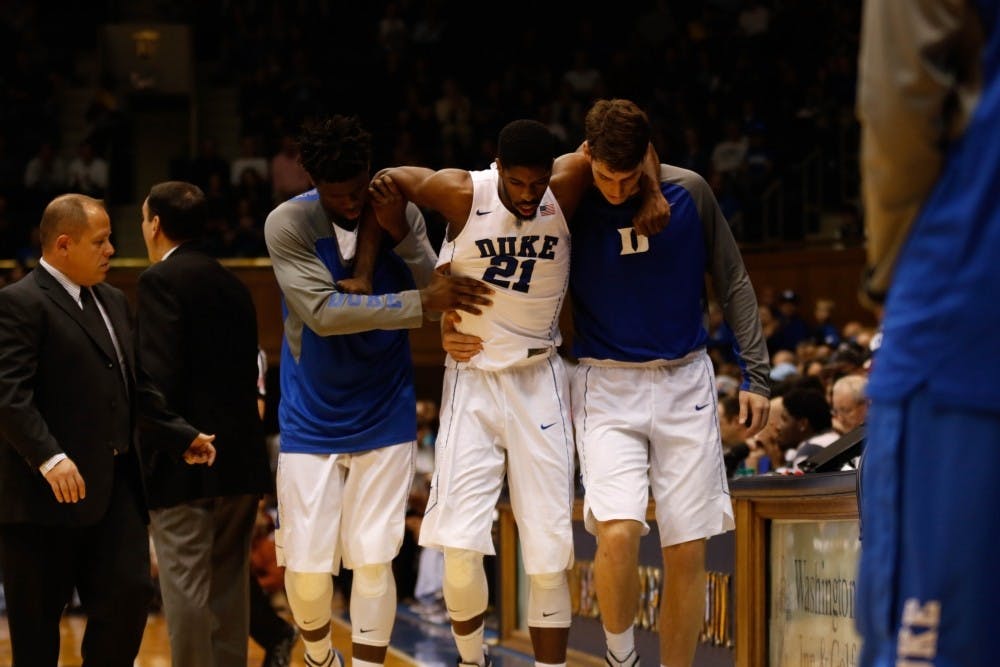Duke had escaped the injury bug early in the season, but the reprieve came to an abrupt end Monday, when the Blue Devils announced that senior captain Amile Jefferson will be sidelined indefinitely with a right foot injury.
Four of The Chronicle's men's basketball beat writers break down a different aspect of how Jefferson's injury affects the Blue Devils moving forward with ACC play on the horizon:
Ryan Hoerger: Jefferson's injury is obviously a significant blow to a Duke team lacking in frontcourt depth. His tenacity on the offensive glass and strong back-to-the-basket post moves made him a key offensive contributor for the Blue Devils, though he rarely received the attention of stars Grayson Allen and Brandon Ingram, and Duke will have to find some interior scoring to keep defenses honest in his absence.
But Jefferson's right foot injury in some ways fulfills an unfortunate circle-of-life. As a freshman, the Philadelphia native saw limited action until Jan. 8, 2013, when then-senior and key offensive cog Ryan Kelly suffered an injury to his right foot against Clemson. Jefferson and junior Josh Hairston were called in to fill in for Kelly, and though the duo never threatened to replace Kelly's 3-point shooting, five of Jefferson's six double-figure scoring outputs came during the 13 games Kelly missed and his usage jumped to 19.6 minutes per game.
It's unclear how much time Jefferson will miss, though the press release announcing the injury certainly wasn't encouraging. If the captain misses extended time, it will largely be up to another freshman, Chase Jeter, to take his game to another level to mitigate the loss of Jefferson's across-the-board contributions.
Brian Pollack: Despite being a highly-touted five-star recruit and the second-rated center in his class, Jeter has managed to slide under the radar thus far for Duke. Now with Jefferson down, Jeter will be forced to play meaningful minutes to spell Marshall Plumlee in the frontcourt and give the Blue Devils more than one capable body down low. In limited action, the 6-foot-10 center has not been a commanding force on either end of the floor to date, but he'll have to learn quickly with Utah and talented 7-footer Jakob Poeltl awaiting Duke Saturday in New York.
Jeter's build is not unlike Jefferson's, but the freshman has a long way to go to fill the senior captain's shoes. The Blue Devils don't need Jeter to replace all of Jefferson's production, but 20-25 minutes of solid interior defense and rebounding is something they should be able to get out of him. Jeter has been prone to foul issues in his limited action—more than seven per 40 minutes—and with the frontcourt already uncomfortably thin, he's going to have to be more careful moving forward.
Sameer Pandhare: Jefferson's injury will force head coach Mike Krzyzewski to make another early-season adjustment to his starting lineup, but it won't be a first-time starter stepping into the limelight. Krzyzewski will likely insert point guard Derryck Thornton—who started against Virginia Commonwealth, Georgetown and Yale in November—back into the lineup and slide freshman Brandon Ingram to the four position. Off the bench, Jeter figures to become a prominent part of the rotation and redshirt sophomore Sean Obi may get a chance if Jeter and Plumlee get saddled with foul trouble.
More than just personnel, Jefferson's injury will alter Duke's playing style. Without the captain, the Blue Devils will have to rely almost entirely on their perimeter players for points. Although Ingram has the size to play in the post, the freshman has struggled down low with the physicality of the college level and has a tendency to float to the perimeter as a stretch four. The team's new rotation favors a more up-tempo attack which is now equipped to play smaller, quicker lineups. Without one of the best offensive rebounders in the nation, the pressure will shift to Plumlee to man the boards and be the only established offensive post presence on the roster.
Amrith Ramkumar: Jefferson's absence will be felt just as much on the defensive end, where Duke will be forced to rely more on its guards to provide stability while its interior defense takes an inevitable hit. In addition to being the Blue Devils' best communicator in pick-and-roll situations, Jefferson's familiarity with Duke's man-to-man scheme and length in its 1-3-1 zone were two of the main reasons the Philadelphia native had been playing so many minutes before his injury. Now with Ingram moving to the power forward position and/or seeing more time up front, the Blue Devils will have to use more ball pressure and activity on the perimeter to disrupt opposing offenses and crash the glass as a unit to compensate for their inexperience up front.
Plumlee will have to be even more cautious on defense to avoid getting into foul trouble—when Duke takes on Utah and Poeltl, who averages 20.1 points and 9.8 rebounds per game, it will need a veteran in the paint on defense Saturday to fill the void left by Jefferson. As has been noted elsewhere, the start to Duke's ACC schedule is relatively light with games against Boston College, Wake Forest, Virginia Tech and Clemson. Three of those four are on the road, but opening against four of the weaker teams in the conference should help Duke's young roster a greater buffer as the Blue Devils try to reconfigure themselves without a senior leader in Jefferson.
Get The Chronicle straight to your inbox
Signup for our weekly newsletter. Cancel at any time.

